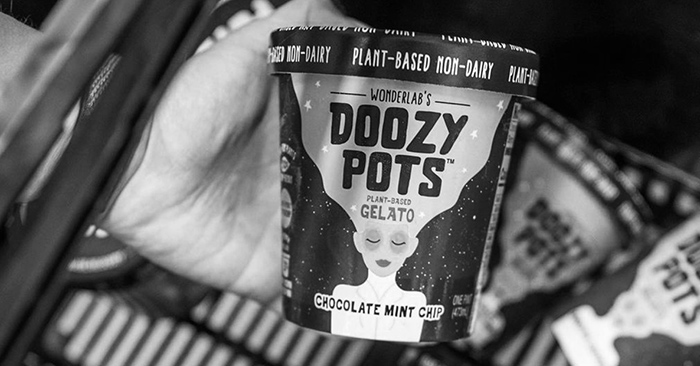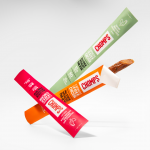Plant-Based Gelato Brand Doozy Pots Shuts Down

Wonderlab, the maker of plant-based gelato brand Doozy Pots, is shutting down after rising costs of goods and category challenges proved insurmountable.
“It took a lot of bravery to put an end to a dream. It felt shameful to admit things aren’t working the way you hoped,” founder and co-CEO Kirsten Sutaria wrote in a LinkedIn post last week announcing that the Ohio-based startup is winding down operations. “The ethos of the entrepreneur is hustle and never quit, to keep going through the hard times in hopes that success is right around the corner. However, the reality of CPG is that you need a lot of money to make money, and margins, velocity & cash flow rule.”
Founded in 2019 by Sutaria, a former global product development manager for Ben & Jerry’s, and her husband and co-CEO Karl Sutaria, Doozy Pots produced a line of premium hemp and oat-based gelatos sold in upwards of 550 retail stores nationwide. The company was financially bootstrapped by the couple, who were also its only full-time employees, and ultimately it was business fundamentals that led them to end the venture.
Speaking to NOSH today, Kirsten and Karl said that although Doozy Pots had laid a promising foundation in retail – with accounts like Sprouts, United Supermarkets, Market District, Erewhon and Jimbo’s, among others – margin pressures created by inflation “at every single point in our supply chain” cut off any viable pathway to sustainable growth.
“We had a few backend challenges that we knew, from a personal capability standpoint, we definitely could have worked through,” Kirsten Sutaria said. “But they were going to require a decent amount of cash, which as a bootstrapped business we didn’t have and would have needed to raise. The timing on that just didn’t line up and we realized the best decision for our life, our family and our peace of mind was that we should wind things down.”
While the company could have cut costs and improved the price/mix by switching to cheaper ingredients, Kirsten Sutaria said she didn’t want to compromise the integrity of the brand by degrading the product.
Although the founders said it was not a major factor in Doozy Pots’ closure, the brand’s use of hemp as its hero ingredient had long been a hurdle in marketing and selling the frozen desserts. According to Kirsten Sutaria, the brand frequently had to address confusion from both consumers and retailers, as well as regulatory pushback and tight limitations on advertising, with many online platforms banning the use of the term – although she said the environment for hemp marketing has improved in the years since the brand first launched.
“If I wanted to do it with sunflower oil, I could have done it with sunflower oil, but I think there’s less of an interesting hook there,” she said. “It was really my belief in hemp as an ingredient and the ability to showcase to people that hemp is delicious, nutritious and a sustainable crop.”
Doozy Pots launched in fall 2019, six months before the onset of the COVID-19 pandemic. Although the early months of the crisis resulted in a brief sales uplift as consumers pantry loaded, Karl Sutaria said the environment was less than ideal for a startup due to lower exploration at the grocery store. As a frozen dessert brand, Kirsten Sutaria said that ecommerce was not a financially feasible option for the company – although it did later launch with delivery platforms like DashMart in select markets.
Even as the end of the company is in sight, Kirsten Sutaria said she’s not staying idle. She has returned full time to her consulting business, KS2 Food Consulting, which she maintained as a “side hustle” while running Doozy Pots and works with companies of all sizes from large national companies to small startups on product development and strategy.
Karl Sutaria said he may have a little downtime in the immediate future, but is already exploring new opportunities within CPG and the natural food business. And although Doozy Pots may have ended in disappointment, the couple said the experience hasn’t scared them off of new entrepreneurial ventures, suggesting instead it was a “training ground” for their next project.
“We ended up where we ended up, but we will still do it again,” Karl Sutaria said. “We’re never not noodling on the next product or brand that we could launch ourselves. So watch this space.”


















